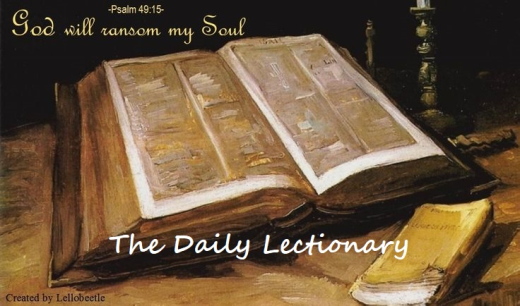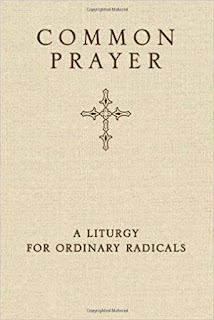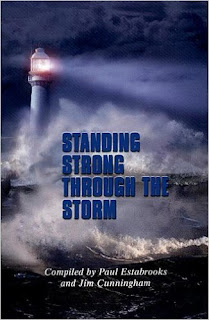 |
| Psalm 81; Genesis 24:1-27; 2 John 1-13 |
The Daily Lectionary
MONDAY, March 16, 2020
(Revised Common Lectionary Year A)
We drink from the rock
1 Sing for joy to God our strength;
shout aloud to the God of Jacob!
2 Begin the music, strike the timbrel,
play the melodious harp and lyre.
3 Sound the ram’s horn at the New Moon,
and when the moon is full, on the day of our festival;
4 this is a decree for Israel,
an ordinance of the God of Jacob.
5 When God went out against Egypt,
he established it as a statute for Joseph.
I heard an unknown voice say:
6 “I removed the burden from their shoulders;
their hands were set free from the basket.
7 In your distress you called and I rescued you,
I answered you out of a thundercloud;
I tested you at the waters of Meribah.
8 Hear me, my people, and I will warn you—
if you would only listen to me, Israel!
9 You shall have no foreign god among you;
you shall not worship any god other than me.
10 I am the Lord your God,
who brought you up out of Egypt.
Open wide your mouth and I will fill it.
11 “But my people would not listen to me;
Israel would not submit to me.
12 So I gave them over to their stubborn hearts
to follow their own devices.
13 “If my people would only listen to me,
if Israel would only follow my ways,
14 how quickly I would subdue their enemies
and turn my hand against their foes!
15 Those who hate the Lord would cringe before him,
and their punishment would last forever.
16 But you would be fed with the finest of wheat;
with honey from the rock I would satisfy you.”
Rebekah at the well
24:1 Abraham was now very old, and the Lord had blessed him in every way. 2 He said to the senior servant in his household, the one in charge of all that he had, “Put your hand under my thigh. 3 I want you to swear by the Lord, the God of heaven and the God of earth, that you will not get a wife for my son from the daughters of the Canaanites, among whom I am living, 4 but will go to my country and my own relatives and get a wife for my son Isaac.”
5 The servant asked him, “What if the woman is unwilling to come back with me to this land? Shall I then take your son back to the country you came from?”
6 “Make sure that you do not take my son back there,” Abraham said. 7 “The Lord, the God of heaven, who brought me out of my father’s household and my native land and who spoke to me and promised me on oath, saying, ‘To your offspring I will give this land’—he will send his angel before you so that you can get a wife for my son from there. 8 If the woman is unwilling to come back with you, then you will be released from this oath of mine. Only do not take my son back there.” 9 So the servant put his hand under the thigh of his master Abraham and swore an oath to him concerning this matter.
10 Then the servant left, taking with him ten of his master’s camels loaded with all kinds of good things from his master. He set out for Aram Naharaim and made his way to the town of Nahor. 11 He had the camels kneel down near the well outside the town; it was toward evening, the time the women go out to draw water.
12 Then he prayed, “Lord, God of my master Abraham, make me successful today, and show kindness to my master Abraham. 13 See, I am standing beside this spring, and the daughters of the townspeople are coming out to draw water. 14 May it be that when I say to a young woman, ‘Please let down your jar that I may have a drink,’ and she says, ‘Drink, and I’ll water your camels too’—let her be the one you have chosen for your servant Isaac. By this I will know that you have shown kindness to my master.”
15 Before he had finished praying, Rebekah came out with her jar on her shoulder. She was the daughter of Bethuel son of Milkah, who was the wife of Abraham’s brother Nahor. 16 The woman was very beautiful, a virgin; no man had ever slept with her. She went down to the spring, filled her jar and came up again.
17 The servant hurried to meet her and said, “Please give me a little water from your jar.”
18 “Drink, my lord,” she said, and quickly lowered the jar to her hands and gave him a drink.
19 After she had given him a drink, she said, “I’ll draw water for your camels too, until they have had enough to drink.” 20 So she quickly emptied her jar into the trough, ran back to the well to draw more water, and drew enough for all his camels. 21 Without saying a word, the man watched her closely to learn whether or not the Lord had made his journey successful.
22 When the camels had finished drinking, the man took out a gold nose ring weighing a beka and two gold bracelets weighing ten shekels. 23 Then he asked, “Whose daughter are you? Please tell me, is there room in your father’s house for us to spend the night?”
24 She answered him, “I am the daughter of Bethuel, the son that Milkah bore to Nahor.” 25 And she added, “We have plenty of straw and fodder, as well as room for you to spend the night.”
26 Then the man bowed down and worshiped the Lord, 27 saying, “Praise be to the Lord, the God of my master Abraham, who has not abandoned his kindness and faithfulness to my master. As for me, the Lord has led me on the journey to the house of my master’s relatives.”
A woman reminded to abide in Christ
1 The elder,
To the lady chosen by God and to her children, whom I love in the truth—and not I only, but also all who know the truth— 2 because of the truth, which lives in us and will be with us forever:
3 Grace, mercy and peace from God the Father and from Jesus Christ, the Father’s Son, will be with us in truth and love.
4 It has given me great joy to find some of your children walking in the truth, just as the Father commanded us. 5 And now, dear lady, I am not writing you a new command but one we have had from the beginning. I ask that we love one another. 6 And this is love: that we walk in obedience to his commands. As you have heard from the beginning, his command is that you walk in love.
7 I say this because many deceivers, who do not acknowledge Jesus Christ as coming in the flesh, have gone out into the world. Any such person is the deceiver and the antichrist. 8 Watch out that you do not lose what we have worked for, but that you may be rewarded fully. 9 Anyone who runs ahead and does not continue in the teaching of Christ does not have God; whoever continues in the teaching has both the Father and the Son. 10 If anyone comes to you and does not bring this teaching, do not take them into your house or welcome them. 11 Anyone who welcomes them shares in their wicked work.
12 I have much to write to you, but I do not want to use paper and ink. Instead, I hope to visit you and talk with you face to face, so that our joy may be complete.
13 The children of your sister, who is chosen by God, send their greetings.
Optional parts of the readings are set off in [square brackets.]
The Bible texts of the Old Testament, Epistle, and Gospel lessons are from The Holy Bible, New International Version®, NIV® Copyright ©1973, 1978, 1984, 2011 by Biblica, Inc.® Used by permission. All rights reserved worldwide.
The Daily Lectionary is a three-year cyclical lectionary. We are currently in Year A. Beginning with the first Sunday of Advent in 2020, we will be in Year B. The year which ended at Advent 2019 was Year C. These readings complement the Sunday and festival readings: Thursday through Saturday readings help prepare the reader for the Sunday ahead; Monday through Wednesday readings help the reader reflect and digest what they heard in worship. Revised Common Lectionary Daily Readings, copyright © 2005 Consultation on Common Texts. www.commontexts.org
The Daily Lectionary for MONDAY, March 16, 2020
Psalm 81; Genesis 24:1-27; 2 John 1-13









